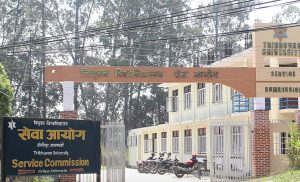
Tackling unemployment has always been a challenge for the government for years. Even though addressing unemployment has been included in various policies, it has failed to implement them.
The main issue in this context, according to government sources, is a lack of coordination between the government’s policies and programmes, due to which unemployment is on the rise every time.
According to the latest data collected by the government for the Prime Minister’s Employment Programme, the number of unemployed citizens listed has increased by more than 100,000 compared to last year.
In the fiscal year 2021/22, a total of 708,245 people were registered by the programme introduced to provide employment for 100 days in small development construction projects. However, in the current fiscal year 2022/23, this number has reached 841,503.
According to the Ministry of Labour, Employment and Social Security, there may be more people unemployed as the number mentioned includes just the people registered for the programme. Many others do not register; the offered construction jobs which do not appeal to the educated youth. Instead, most choose to go abroad.
The fantasy of foreign jobs

In the last fiscal year 2021/22, the number of people joining foreign employment was nearly 637,000. The number of Nepali who took the final work permit to go for work abroad reached 354,660. In one year, the number of Nepalis who took labour permits again for foreign employment increased by 198.5 per cent to hit 282,453.
Likewise, this fiscal year too, the number is huge. Within the three months of the fiscal year 2022/23, the number of those who took the final work permit for foreign employment increased by 123.1 per cent. According to the data from the Foreign Employment Department, 104,793 people went abroad with a new work permit in the first quarter.
The number of Nepalis who re-take labour permits for foreign employment has increased by 66.2 per cent during the review period. During this period, 57,861 workers have gone abroad after renewing their work.
The reasons
Foreign employment expert Jeevan Baniya says that workers stuck at home due to the Covid crisis are going back to their jobs.
“There is no decent job with reasonable wages in the country,” he says, “So, the unemployed youth look for an alternative, and that alternative is foreign employment.”
After the pandemic, many workers in construction, tourism, industry and other sectors became unemployed. The tourism and construction sectors consisting of workers around one million each before the pandemic have still not been able to get back to their previous rhythm. Although the tourism sector has improved somehow, the arrival of foreign tourists has not reached the previous rate.
At this time, economic activities in the country are slow. Due to the contraction in demand, workers are being cut in sectors such as automobiles.
Vishnu Agarwal, the president of the Confederation of Nepalese Industries (CNI), says the contraction in the demand for various goods and services in the market has also affected the employment sector. Due to this, he says, industrialists have to manage their operating expenses through methods such as unpaid leave.
“Due to over-regulatory policies, the private sector is discouraged, it has affected the market cyclically,” he says.
No implementation of policies and programmes

Under the government’s schemes, to deal with the unemployment crisis, there are provisions such as providing seed capital and innovation promotion to develop entrepreneurship, but they have not reached the unemployed youth.
Likewise, there are provisions for arrangements to provide loans on the basis of projects in agriculture and forestry, tourism infrastructure, information technology, and industrial and domestic and small industrial sectors.
Then, the government has a policy of encouraging migrant returnees to work in the production and self-employment sectors by investing their experiences skills and capital. Concessions have been provided for business operations too.
Yet, the number of unemployed people is on the rise, suggesting the government has failed in its implementation of policies and programmes accordingly.
After the pandemic, even the people starting enterprises have also not been successful and have hence gone abroad again. Experts say that in various cities, the jobless class working as street vendors are being chased away in the name of pedestrian pavement management, adding to the unemployment problem.
Baniya says that until the policies and programmes are implemented, the unemployment problem cannot be solved and it will not be possible to create jobs within the country and give opportunities to the youth within the country. He says that the situation will deteriorate instead of change unless the private sector is given an environment for investment.
“Young people are attracted to new destinations in eastern Europe,” he says, “The unemployment rate is increasing not only in the Gulf; Nepali people are going to other destinations as well.”
“What should the youth do when there is no alternative?”
This story was translated from the original Nepali version and edited for clarity and length.






























